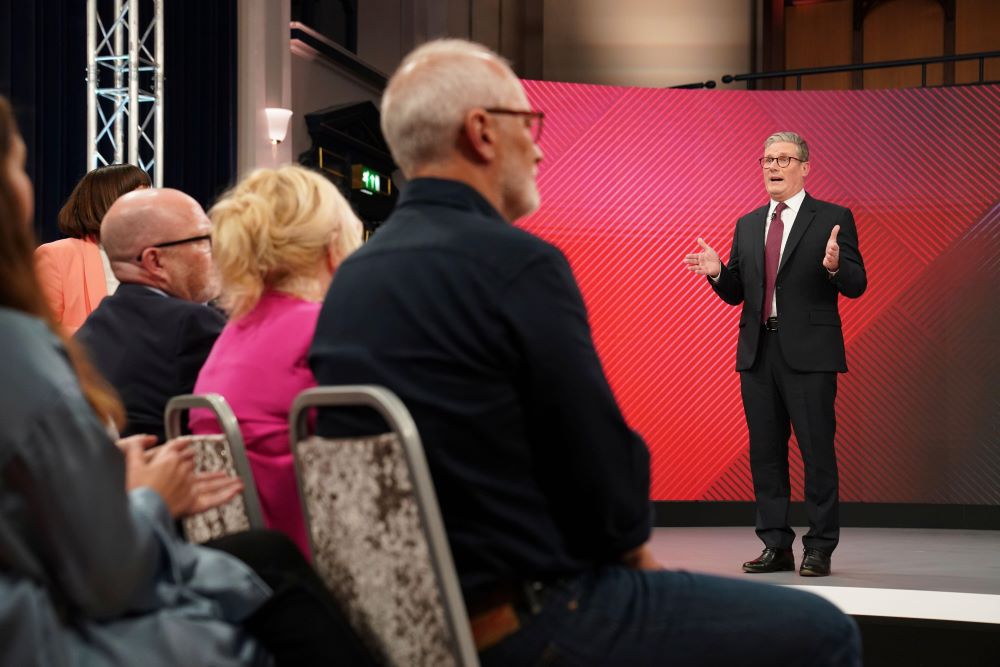TV Debate: Rishi Sunak Admits Failure To Deliver His 5 Pledges
Britain's Prime Minister Rishi Sunak speaks with Sky's political editor Beth Rigby during the Sky News election debate
4 min read
Rishi Sunak admitted he had failed to deliver some of his key pledges to the nation as both him and Labour leader Keir Starmer faced a tough interrogation in the Sky News leaders debate.
Sunak and Starmer were interviewed by Sky's Political Editor Beth Rigby on Wednesday evening in Grimsby, before taking questions from a live audience. It was the second televised event involving the pair, taking place with three weeks to go until the 4 July General Election.
Soon after becoming prime minister in late 2022, Sunak set five pledges for his government to achieve. They were to halve inflation, grow the economy, get debt falling, cut NHS waiting lists and stop small boat crossings.
Sunak acknowledged in his interview with Rigby that NHS waiting lists had risen since he entered office around 18 months ago.
He was challenged and heckled by some members of the audience when he said that industrial action in the health service, including strikes by junior doctors, had put more pressure on waiting lists.
The PM, who opinion polls suggest is very likely to lose next month's election, was also pressed on the government's failure to "stop" small boats arriving in the UK, and acknowledged that crossings are up this year compared with the same period in 2023.
Sunak tried to counter this point by claiming small boat arrivals had fallen during his time as leader.
“You’ve picked one particular period. If you look at the sum total of time, I’ve been Prime Minister, the numbers are down," he said in response to Rigby. "These things are cyclical because what you’ve seen is one new country, Vietnam, accounting for most of the new arrivals."
Sunak was also pressed by a voter who said his daughter had found it more difficult to get on the housing ladder after Liz Truss’s mini budget caused mortgage rates to rise. Sunak said buying a home should become easier in the next few years as interest rates were forecast to fall, and added that if re-elected his party would slash stamp duty.
Perhaps the most difficult moment of the night for Sunak came when a former chair of a local Tory association said the actions of successive Conservative governments, citing partygate and his decision to leave D-Day commemorations early last week, had made her "feel ashamed" and unsure whether to vote for the Conservatives on 4 July.
Speaking to journalists after the debate, Tory minister Mark Spencer gave Sunak an eight-out-of-ten rating for his performance at the leaders debate, admitting that there was "always room for improvement".

It was not plainsailing for Starmer, however, who faced tough questions on trust, his plans for power, and his previous support for Labour's former leader Jeremy Corbyn.
Starmer confirmed that scrapping the two-child limit would not be in the Labour manifesto, which is being published on Thursday. The news will disappoint elements of Labour who want the leader to go further in tackling poverty.
Attempting to justify his position, Starmer said former Labour leaders had "reached for the tax lever” too easily and that the economic conditions meant there are limits on what he can promise to voters.
“It's been a really difficult decision for all the reasons you outlined because the last Labour government had a laser focus on dealing with child poverty and did a huge amount of good work,” he said.
“We will have a strategy for child benefit. I think people are fed up with politicians who say before the election they’ll do everything… It’s a difficult choice, we will have an anti-child poverty strategy.”
He was also grilled by Rigby on his previous campaigning to get Corbyn in Downing Street, and whether he was being honest when he said his predecessor would have made a "great" prime minister.
The Labour leader didn't directly answer whether he had been honest. Instead, he said he was certain that Labour would go on to lose the 2019 general election and wanted to help get as many Labour candidates who he liked elected as possible. Corbyn has been kicked out of the Labour Party and is running as an independent to retain his London seat Islington North.
Starmer faced questions from the interviewer and audience on tax increases, public spending, and the impact on education Labour’s pledge to add VAT on private schools would have.
In a tricky moment for the Labour leader, an audience member accused him of being a "political robot" who does not answer questions directly.
However, a snap YouGov poll published immediately following the debate suggested Starmer was seen as the clear winner. Sixty four per cent of 1,865 respondents said the Labour leader was the winner, while 36 per cent went with Sunak.
